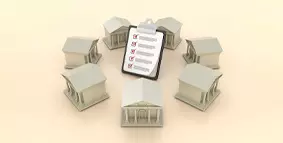

Consider these tips before making a switch
There is plenty to consider before you switch to another financial institution. If you are thinking about leaving the bank where you currently have a checking or savings account, you should understand your options. To make sure you get the right account for your needs, and perhaps avoid some stress, take a moment to review these tips.
Should you stay or go?
Figure out what you want most from a bank, and then compare the benefits and costs of doing business at different institutions. Do not let short-term promotional offers be the only factor in your decision making. Discuss matters with your bank before switching. For example, if you are considering closing an account because the institution is charging a new fee, ask if you can avoid that cost by signing up for direct deposit. If you notice a better offer or rate from a competitor, ask if your institution can match it.
If you decide to go, there are things to consider
After considering your options, perhaps you find that the benefits of changing institutions are worth more than the benefits of staying. Here are steps that may help ensure a smooth move.
- Setup future direct deposits to go to your account at the new bank
The process may take several weeks so plan ahead. If you automatically transferred money from checking to savings at your old bank, start making those transfers at your new bank as well. This also might be a good time to increase your savings commitment. FDIC Consumer News: Starting Small Can Lead to Big Savings has ideas on maximizing your savings. - Consider starting small
If you can, open your new checking account at or slightly above any minimum balance to avoid fees if you do not expect to begin using it right away. Consider keeping enough money in your old account long enough to pay remaining bills. If you are moving a certificate of deposit, visit FDIC Consumer News: Shopping for a Certificate of Deposit? for things to think about. - Decide if you want to write checks and, if so, where to buy them
Many people choose to conduct transactions using a debit card instead of writing checks. If you do want to order checks, remember that you are not required to purchase them from your bank and you may be able to find a better deal from a check printing company. If you choose to get checks, consider starting the numbers close to where your current supply ends in the event a business associates checks with low numbers with those that might be newly-banked. - Have bills that are automatically paid out of your old account transferred to your new account
If you authorized a utility or another company to withdraw funds from your checking account, you may need to go back to that company to make the necessary changes. If you are using your bank’s online bill-pay feature to automatically handle these incoming bills, cancel the bill payments on your old bank’s website and enroll at the new bank’s site. Be aware that process that can take a few days to finalize, so be sure to make any changes well before payment due dates. - Guard against overdrafts or late fees during your transition period
Carefully monitor each account at your old bank that is connected to direct deposits or automatic bill payments in case you need to pay a bill another way, such as in person or by check, to avoid being charged a fee. - Make sure all withdrawals have posted to your old checking account before you close it
Prematurely closing the account before all checks, debit card payments, ATM withdrawals or other transactions have been paid from the account could trigger fees or other problems. Find more information on Overdraft and Account Fees here. - Securely dispose of all your old checks and debit/ATM cards after your account is closed
Do not assume that just because your account is closed that checks or debit cards associated with the old account cannot be used by a thief or cause hassles for you. If you are closing a credit card account, pay attention to the tips above, particularly ensuring that automatic payments or pending purchases will be handled without incident. For additional guidance on how to avoid hassles or unnecessary fees, speak with customer service representatives at your old and new bank.
Beware of impostor scams and fake banks
When searching for a new institution, be aware that there may be scammers and fake banks that often pretend to be from an organization you might know and trust (such as an FDIC-insured bank) to try and get your personal information. FDIC can help you verify whether a website is a fraudulent entity pretending to be an FDIC-insured bank or the legitimate website of an FDIC-insured bank. You can confirm the status of a bank by checking on the FDIC’s BankFind. Read more about avoiding Scammers and Fake Banks.
Understand your options and choose the best institution and account(s) for your needs before you move your money.
Additional resources:
FDIC, My Banking Checklist
FDIC, #GetBanked
FDIC, Is My Money Insured by the FDIC?
FDIC, The Importance of Deposit Insurance and Understanding Your Coverage
Consumer Financial Protection Bureau (CFPB), Checklist for opening a new bank or credit union account
For more consumer resources, visit FDIC.gov, or go to the FDIC Knowledge Center. You can also call the FDIC toll-free at 1-877-ASK-FDIC (1-877-275-3342). Please send your story ideas or comments to ConsumerEducation@fdic.gov. You can subscribe to this and other free FDIC publications to keep informed!
